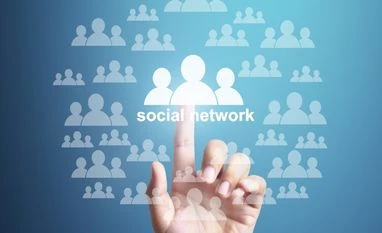Facebook, Twitter and other social media users regard themselves as unhappier and less popular than their friends, a study has found.
The research also found that people with the most number of connections on social media are happier that those with fewer friends.
For the purpose of the study, which used data from Twitter, reciprocal followers were defined as "friends" and users with the most connections were defined as "popular."
The study builds upon a phenomenon known as the Friendship Paradox, which finds that most people on a social network have fewer connections on average than their friends, since the most popular users intersect with a higher-than- average number of social circles.
The study is the first to reveal that these more popular users are also happier on average, inflating the overall happiness level of a user's social circle - an effect the researchers dubbed the "Happiness Paradox."
"This study suggests that happiness is correlated with popularity, and also that the majority of people on social networks aren't as happy as their friends due to this correlation between friendship and popularity," Bollen said.
To conduct the analysis, researchers randomly selected 4.8 million Twitter users, then analysed the group for people who followed one another on the network, creating a social network of about 102,000 users with 2.3 million connections.
The team then narrowed their focus to individuals with 15 or more "friends" on the network, after which they analysed the sentiment of these users' tweets, a common method in computer science and marketing to assess whether digital postings are generally positive or negative in tone.
This created a group of 39,110 Twitter users. Users with higher positive sentiment were defined as "happy."
A statistical analysis of that final group found that 94.3 per cent of these users had fewer friends on average than their friends.
It also found that 58.5 per cent of these users were not as happy as their friends on average.
"In other words, a majority of users may feel that they're less popular than their friends on average," Bollen said.
"They may also have the impression that they're less happy than their friends on average," he said.
"Overall, this study finds social media users may experience higher levels of social dissatisfaction and unhappiness due to negative comparison between their and their friends' happiness and popularity," Bollen said.
"Happy social media users may think their friends are more popular and slightly happier than they are - and unhappy social media users will likely have unhappy friends who still seem happier and more popular than they are on average," he said.
The research also found that people with the most number of connections on social media are happier that those with fewer friends.
For the purpose of the study, which used data from Twitter, reciprocal followers were defined as "friends" and users with the most connections were defined as "popular."
More From This Section
"This analysis contributes to a growing body of evidence that social media may be harmful to users who 'overindulge' in these services since it's nearly impossible to escape negative comparisons to their friends' popularity and happiness," said Johan Bollen, from Indiana University in the US.
The study builds upon a phenomenon known as the Friendship Paradox, which finds that most people on a social network have fewer connections on average than their friends, since the most popular users intersect with a higher-than- average number of social circles.
The study is the first to reveal that these more popular users are also happier on average, inflating the overall happiness level of a user's social circle - an effect the researchers dubbed the "Happiness Paradox."
"This study suggests that happiness is correlated with popularity, and also that the majority of people on social networks aren't as happy as their friends due to this correlation between friendship and popularity," Bollen said.
To conduct the analysis, researchers randomly selected 4.8 million Twitter users, then analysed the group for people who followed one another on the network, creating a social network of about 102,000 users with 2.3 million connections.
The team then narrowed their focus to individuals with 15 or more "friends" on the network, after which they analysed the sentiment of these users' tweets, a common method in computer science and marketing to assess whether digital postings are generally positive or negative in tone.
This created a group of 39,110 Twitter users. Users with higher positive sentiment were defined as "happy."
A statistical analysis of that final group found that 94.3 per cent of these users had fewer friends on average than their friends.
It also found that 58.5 per cent of these users were not as happy as their friends on average.
"In other words, a majority of users may feel that they're less popular than their friends on average," Bollen said.
"They may also have the impression that they're less happy than their friends on average," he said.
"Overall, this study finds social media users may experience higher levels of social dissatisfaction and unhappiness due to negative comparison between their and their friends' happiness and popularity," Bollen said.
"Happy social media users may think their friends are more popular and slightly happier than they are - and unhappy social media users will likely have unhappy friends who still seem happier and more popular than they are on average," he said.
)